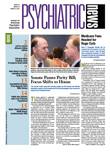Army physicians are proceeding with a step-by-step introduction of a computerized screening test they hope will pick up neurological deficits resulting from traumatic brain injuries (TBIs) caused by roadside bombs in Iraq and Afghanistan.
“As the war has changed, there are bigger blasts and thus bigger exposure,” said Col. Jonathon Jaffin, MC, acting commander of the U.S. Army Medical Research and Materiel Command and a trauma surgeon. In fact, over 80 percent of wounds suffered in Iraq are caused by explosions. Many of the injured have no open head wounds, but shock waves from blasts may cause a brief loss of consciousness, ringing and bleeding in the ears, confusion, or temporary hearing loss.
The Army also wants to alert civilian psychiatrists and other physicians that they may see more former service members who have had blast injuries or post-traumatic stress disorder (PTSD).
“Perhaps 70 percent of soldiers with TBI have mild injuries, and the vast majority recover over time,” Jaffin told a press conference at the Army surgeon general's office in September. Some of the rest may have somatic or behavioral symptoms that may seem minor to the soldier or even unconnected to the event. Surveys of soldiers in combat units returning to Ft. Carson, Colo., found that as many as 17 percent could have mild TBI, he said.
That percentage might not apply to all combat units, but such numbers aren't available because there has been no comprehensive screening for TBI.
“We're pushing to do a lot more surveillance, but even so we know it's a serious problem, and we have to make an effort now,” said Jaffin.
The Army is starting to use the Automated Neuropsychological Assessment Metric (ANAM), originally developed by military researchers to assess cognitive side effects of chemical warfare antidotes and pretreatment agents. It has since been adapted by the Defense and Veterans Brain Injury Center at Walter Reed Army Medical Center as a screening tool for brain injury.
“The ANAM doesn't replace a clinical evaluation, but it's a great screening tool,” said Jaffin. The test collects standardized, objective data on cognitive function and reaction time and alerts medical personnel to changes that signal a need for further medical evaluation. It can then be used to track a patient's recovery.
“Often, no evidence of neurological impairment shows up on X-rays or MRIs, so the ANAM gives us a tool to convince officers that a soldier should come off the line and get evaluated,” he said. “Soldiers just want to shrug off injuries.”
That “suck-it-up” attitude can hinder efforts to diagnose and treat both TBI and PTSD, said Jaffin. “We emphasize confidentiality and encourage them to get help, but that's a cultural change and won't happen overnight.”
In part to nudge that change along, the Army began a campaign last summer to require everyone along the chain of command to learn, teach, and discuss issues involving TBI and PTSD.
The ANAM is already being used to create a baseline cognitive measure of a division scheduled to rotate back to Iraq shortly. Soldiers exposed to bomb blasts or other head trauma will be screened using the same tool. Then the entire division will go through the same test on their return home to measure the effects of any mild brain trauma that may have been missed in the war zone. The Army will evaluate the ANAM's sensitivity, specificity, and accuracy during this process.
Other tests for TBI—such as quantitative EEG or tests for brain enzymes released into the bloodstream—are still in the research stage, said Jaffin.
While most troops returning from Iraq or Afghanistan will have access to military or Veterans Affairs health systems, a large minority may go elsewhere for care, said Col. Elspeth Ritchie, MC, psychiatric consultant to the Army surgeon general.
The stigma attached to PTSD and TBI still remaining among members of the military may also induce service members who are worried that disclosure may harm their careers to visit civilian doctors.
“Civilian doctors will see soldiers no longer on active duty and who live far from VA facilities or are using student health insurance when they go to college, or are back at work and covered by their employer's health insurance,” said Ritchie. “They should ask veterans—who may be of almost any age—if they have been exposed to head trauma, blasts, or other traumatic events,” which could indicate a need for further screening or monitoring.
Civilian physicians should also be ready to help families understand that TBIs may cause behavioral symptoms such as anger or depression, symptoms that may appear months or years after a soldier's return from war, said Ritchie. Finally, pediatricians should be aware that behavioral changes in parents with TBI or PTSD may affect relationships with their children.
Information about traumatic brain injury is posted at the Department of Defense's Deployment Health Clinical Center at<www.pdhealth.mil/TBI.asp>.▪
